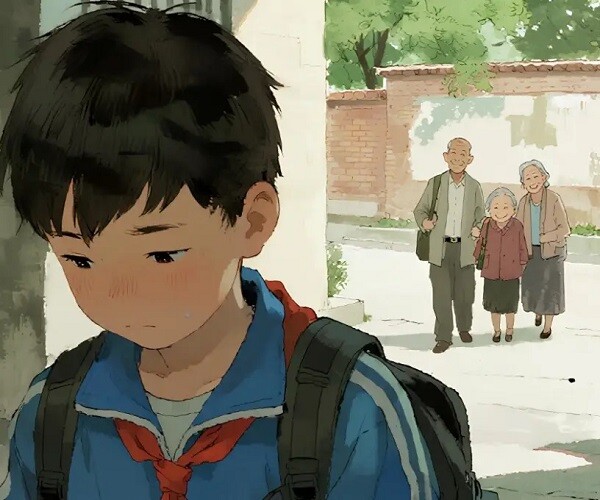However, many fathers today unintentionally limit their time with their children due to their busy lives. But in reality, what children truly want is: “Am I happy today?” “Dad, trust me” “Let’s play together!”


Dad becomes invisible in his child’s life
Tieu Vu is in 4th grade, and his father has never hit or shouted at him. The only sound at the dinner table is the clinking of chopsticks, with no interaction or sharing between family members. When Tieu Vu gets full marks on a test and wants to share his joy, his father coldly says: “Don’t be so proud.”
This cold attitude makes Tieu Vu feel like his happiness is worthless, and his efforts are not acknowledged.
When a child falls and cries in pain, the father frowns and asks: “Can’t you take such a small fall?” This reaction unintentionally creates distance and makes the child feel lonely within their own family.
A student wrote in an essay: “My dad is like the wifi at home, the signal is always full, but I can never connect.” This sense of loneliness comes from a lack of interaction, encouragement, and emotional presence from the father.
Children not only need material care but also crave emotional connection and encouragement from their fathers. They need to know that their emotions are respected and their efforts acknowledged.
The lack of emotional connection and communication can leave psychological wounds, affecting children’s self-confidence and personality development. The father is not only a role model but also a companion and supporter in their child’s journey to adulthood.

Dad becomes invisible in his child’s life.

The emotionally unstable father
A 5th-grade boy was publicly scolded by his father for getting low scores, and shame and disappointment filled his heart. The surrounding eyes added fuel to the fire, making the boy feel embarrassed and gradually losing his self-confidence.
The father’s irritability, loud voice, and stern attitude make the boy feel like he is always failing. The criticism becomes psychological scars that are hard to erase. The boy worries about improving his grades and is afraid of not pleasing his father.

The emotionally unstable father.
When the boy returns home, the tense atmosphere envelops everything. Every time he sees his father, he feels nervous and anxious. The feeling of loneliness makes him withdraw and not share his thoughts and emotions with anyone.
Moreover, the father’s outbursts create an unsafe environment. The boy begins to feel that he must always be perfect and get high scores to avoid his father’s anger.

The father who doesn’t respect his partner
The father complains that the mother’s food is too salty, making the meal heavy and uncomfortable. Later, when the son starts dating, he unconsciously carries a part of his father’s character learned from the arguments at the dinner table. When his girlfriend asks, “Today’s food is a bit bland,” he throws the chopsticks down and says: “Eat it or don’t, it’s up to you!”
Carl Jung once said that children do not listen to their parents but observe their actions. What children observe from their parents will deeply influence how they understand and interact with the world around them.

The father who doesn’t respect his partner.
When the father constantly expresses dissatisfaction and disrespect for others’ efforts, especially the mother, the child learns that complaining is a way to exert power and control.
Over time, the child learns to “endure” and witness the arguments and disrespect between the father and mother. As they grow up, they tend to accept compromise in relationships and always put others’ needs before their own.
This leads to unhealthy relationships, as well as a sense of worthlessness and not deserving love and respect.

The father who complains about family difficulties
“We’re poor, don’t compare yourself to your classmates.” “Why buy this? It’s a waste of money.” These words sound like reminders, but they are actually as heavy as a rock on a child’s soul.
A student shares: “When my father refused to buy me reference books, I felt like I didn’t deserve anything good.”
When children desire something, the lack of empathy from adults can make them feel unloved. This feeling of unworthiness follows them throughout their lives, making them feel inadequate and inferior to their peers.
True wealth is not about spending money recklessly but about supporting and encouraging children’s dreams.
When children feel that their father is on their side, they will be more confident in exploring the world, daring to dream and pursue their aspirations.

The father who complains about family difficulties.

The father who always says, “I don’t have time”
A child’s growth is like a bus journey. If you miss this stop, it will be hard to go back. Every passing moment, every second not shared, is an opportunity lost.
For fathers who always say, “I don’t have time,” their children will grow up feeling lonely.
When children need support, encouragement, and love, the father’s absence can create voids. Children may seek attention from other sources, sometimes unhealthy relationships, or feel a sense of loss during important moments in their lives.

When a father doesn’t make time for his child, the emotional deprivation can easily lead to a sense of unworthiness.
Holidays, school performances, or small achievements become lonely events without the father’s presence.
Time is irreplaceable. Conversations during meals, walks in the park, or simply watching a movie together are all precious memories.
When a father doesn’t make time for his child, the emotional deprivation can lead to a sense of unworthiness and low self-esteem, affecting their self-perception and future.
Why Won’t Mom Let Me Play With Her Phone? A Guide for Curious Kids.
“Screen time and kids: a delicate balance for parents to navigate. It’s an all-too-familiar scenario: your child, glued to the phone or tablet, seemingly oblivious to the world around them. As a parent, your natural instinct might be to worry about the impact of this on their development. But how you respond matters; it will shape their relationship with technology and influence their growth.”
5 Traits of a Family That Signals a Child’s Future Success and Wealth: Does Your Family Have What It Takes?
“Certain familial traits and dynamics can significantly impact a child’s future success and wealth accumulation. This introduction explores the intriguing connection between specific family characteristics and the likelihood of raising children who go on to achieve financial prosperity and maturity.”




































